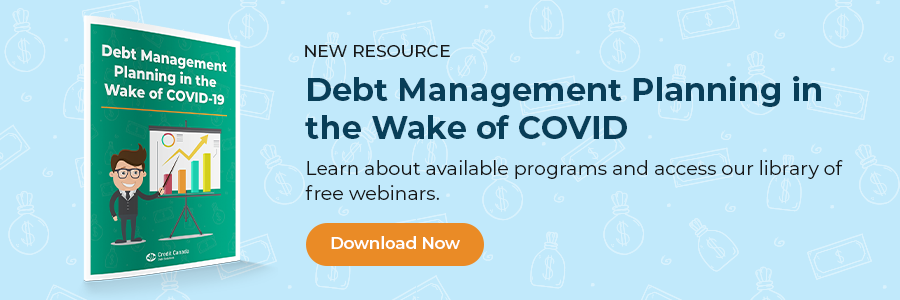
Top 7 Ways to Get Out of Debt
When times get tough, getting out of debt can seem impossible. But with a bit of organization and planning, and some helpful tips and support along the way, you can make getting out of debt a reality, and start building new dreams and goals. Don't let money stress take over when you're ready to tackle your debts. Instead, breathe, reset, and implement some of these tips and strategies on how to get out of debt.
How to Get Out of Debt Faster
Facing financial challenges can impact many different areas in your life, from relationships to your career. A lot of us carry emotional baggage when it comes to money issues and finances, and juggling debt is definitely a major trigger for stress. This is why many Canadians would rather not face their financial reality, and instead focus on just getting by to the end of the month, even if that means taking on a payday loan, maxing out their credit cards, or applying for other high-interest loans and credit products. But all of these avenues just make a debt situation exponentially worse. That's why it's best to get your debt situation under control, get a repayment plan in place that makes sense for you and your budget, and move forward towards financial freedom and wellness.
If you want to start tackling your debt and resolve it once and for all, follow the steps below. And if you need some additional help and support along the way, there are tons of free resources out there than can help, starting with the wonderful, caring Credit Counsellors at Credit Canada.
1. The first step in getting out of debt is to create a budget and track expenses
Creating a budget and tracking your expenses is crucial when you want to get out of debt for good. By recording all of your spending by category (e.g., groceries, cigarettes, etc.) you’ll have a better idea of where your money goes each month. While fixed expenses like rent or car insurance are generally consistent, using a Budget Planner + Expense Tracker (whether it be on paper or on your desktop) can ensure that you don’t spend more than you intended on items with costs that tend to fluctuate.
2. Live within your means to avoid adding more debt
Many Canadians have either lost their jobs, experienced reduced hours, or been temporarily laid off. If your living situation or work situation changes, leaving you with less income than before, and you fail to adjust your lifestyle to reflect those changes, well, that’s a recipe for disaster. Going on vacation, having a nice car and getting take out on a regular basis are perfectly fine if you can afford to do so. But if not, don’t get caught in a trap of spending more money than you bring home.
3. Find ways to increase your income so you can pay off debt faster
Consider ways you can bring home more bacon to help make ends meet. Ideas for increasing income can include dog walking, selling items online, or becoming an UberEats or SkipTheDishes driver. Could you possibly take on a second job or start working overtime? How about renting out a spare room or selling an asset? There are tons of different ways you can earn more money. Many people have started their own online business by selling crafts, natural products, and offering their skills online, like yoga sessions and workout classes. You may have to step out of your comfort zone and think outside the box, but it'll definitely be worth it once you see the difference it can make to your bottom line.
4. Reduce your monthly expenses so you can put more money towards your debts
We can all cutback somewhere in our budgets. It’s your decision where to place priorities in your budget but common spending items to consider cutting back on are daily takeout, coffees and other beverages, spending less on birthdays and holidays, getting cheaper cellphone plans, cable packages, and streaming streaming services (maybe even eliminating some streaming services entirely). You should also consider switching to non-brand name products, cutting out memberships you no longer use, like gym memberships and parking, and looking for cheaper insurance products. Switching to a healthier lifestyle can also lead to more money in your budget.
5. Be honest about your debt situation to help manage expectations
If you're struggling financially, let those who care about you know, including those people in your life who might affect or be affected by your debt issues, such as a partner. If your partner doesn’t realize there is a need for a change in your spending patterns and habits, how can you expect them to stop any costly behaviours? When possible, coming up with a household budget together ensures that everyone is on the same page, everyone gets a say, and those involved are more likely to stick to it and be successful.
6. Don't procrastinate getting the debt help you need
The sooner you act to make changes to your spending habits and find a solution to whatever debt issues you might be facing, the more options there will be available to you. But the longer you wait to get started, the less options you will leave yourself, and you may forced to consider insolvency, like a consumer proposal and bankruptcy, which can have a lasting impact on your overall financial health for years to come. Plus, the longer you wait to resolve your debt, the more interest will accumulate on your outstanding debt balances, and the chances of your accounts being sent to collections or to court will be much higher.
7. Seek professional help to get out of debt
Even if it’s just to get a second opinion about what options are out there, getting professional credit counselling and speaking with a certified Credit Counsellor from a not-for-profit credit counselling agency can help clarify the extent of your situation. Perhaps there are ways you can handle the debts on your own that you weren’t aware of, or maybe using the help of a third-party, like Credit Canada's Debt Consolidation Program (DCP) is best to reduce the burden of not being able to keep up with the bills. They say knowledge is power, so there's no harm in doing some research.
Credit Canada can help you get out of debt for good
Of course every situation is unique. One of these suggestions or a combination of them may be enough to help someone out of debt, while someone else might need a bit more help. If in doubt, contact Credit Canada at 1.800.267.2272 to see if our certified Credit Counsellors can offer any additional, unbiased advice. As Canada's first and longest-standing not-for-profit credit counselling agency, all of our counselling is free, confidential, non-judgmental, and there's no obligation.
You can also book a free Debt Assessment online by clicking here and filling out the form. We'll discuss all your debt relief options, the pros and cons of each, how they can each impact your long-term goals, and which one might be the best fit for you. Then you decide what option you want to go with, and we'll help you with any next steps. It's that easy!
Frequently Asked Questions
Have questions? We are here to help
A Debt Consolidation Program (DCP) is an arrangement made between your creditors and a non-profit credit counselling agency. Working with a reputable, non-profit credit counselling agency means a certified Credit Counsellor will negotiate with your creditors on your behalf to drop the interest on your unsecured debts, while also rounding up all your unsecured debts into a single, lower monthly payment. In Canada’s provinces, such as Ontario, these debt payment programs lead to faster debt relief!
Yes, you can sign up for a DCP even if you have bad credit. Your credit score will not impact your ability to get debt help through a DCP. Bad credit can, however, impact your ability to get a debt consolidation loan.
Most people entering a DCP already have a low credit score. While a DCP could lower your credit score at first, in the long run, if you keep up with the program and make your monthly payments on time as agreed, your credit score will eventually improve.
Anyone who signs up for a DCP must sign an agreement; however, it's completely voluntary and any time a client wants to leave the Program they can. Once a client has left the Program, they will have to deal with their creditors and collectors directly, and if their Counsellor negotiated interest relief and lower monthly payments, in most cases, these would no longer be an option for the client.

